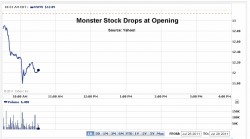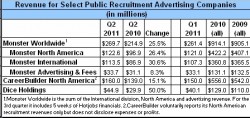![]() On a day when new unemployment claims fall below 400,000 for the first time since April, and Monster reports its strongest quarter since 2008, what happens? The company’s stock opens down and only goes lower.
On a day when new unemployment claims fall below 400,000 for the first time since April, and Monster reports its strongest quarter since 2008, what happens? The company’s stock opens down and only goes lower.
If this was one of those no-future-for-job boards things, then we might expect to see Wall Street discounting all the publicly held recruitment publishers. But Dice Holdings, which reported its strong quarter Tuesday morning, is up. And the Chinese careers company, 51Job, which has annual revenue that’s less than Monster’s quarterly take, is trading at $64.82, down .2 percent.
 Not two hours after the company ended its quarterly financial conference call with analysts, Monster’s stock is selling at $12.06 a share. That’s an 8 percent drop from Wednesday’s $13.14 close.
Not two hours after the company ended its quarterly financial conference call with analysts, Monster’s stock is selling at $12.06 a share. That’s an 8 percent drop from Wednesday’s $13.14 close.
It doesn’t seem to make sense considering Monster earned 9 cents a share, a penny more than what analysts were expecting. It reported 2nd quarter revenue of $269.7 million, well above expectations and even a bit more than the company’s own best prediction.
Its international business grew 31 percent over the 2nd quarter last year and now rivals its North American revenue, which increased by a not-too-shabby 26 percent to $122.6 million.
With those kinds of numbers, and predictions of a strong 3rd quarter, Monster Chairman, President and CEO Sal Iannuzzi was hardly boasting when he opened his presentation this morning, saying, “We are pleased with our financial performance.”
 Considering the economic conditions worldwide, and especially the lackluster job growth in the U.S., Iannuzzi’s comment could even be considered understatement. Indeed, answering analyst questions later in the call, Iannuzzi said, “In general, business has been sluggish all year.” “More sluggish,” he added, “than we would have expected.”
Considering the economic conditions worldwide, and especially the lackluster job growth in the U.S., Iannuzzi’s comment could even be considered understatement. Indeed, answering analyst questions later in the call, Iannuzzi said, “In general, business has been sluggish all year.” “More sluggish,” he added, “than we would have expected.”
In his opening Iannuzzi touted the launch of Monster’s biz-focused social network, BeKnown, and its versatile sourcing search tool, SeeMore. Bookings, the annual contracts for job postings, searching, and other services, increased 26 percent during the quarter. International bookings, Iannuzzi said, accounted for almost 50 percent of the contracts.
If anything could be considered big news (besides, that is, the quarterly numbers themselves) it would be that the company has decided to get out of the lead generation business. Those are the ad banners promoting trade, vocational, and online schools. In years past, credit card solicitations and a few other similar pitches were among them.
Media companies typically get a fee for every person who fills out one of the applications for information. Credit card companies used to pay $25 and up for each and some of the schools have paid multiples of that for every person signing.
Because it wasn’t so profitable, and because of government crackdowns on the for-profit education sector, which is resulting in new regulations, Monster won’t be running those ads anymore. It was worth $50 million annually in revenue, but was, Monster’s CFO said, essentially a break-even proposition.
What’s behind the stock hit? Perhaps it’s uncertainty about the debt ceiling issue in Washington, which affects Monster’s government service contract that represents about 10 percent of its North American revenue. Perhaps it’s worries about the global economy and job growth. The Chinese labor market is strong, so 51Job is less affected, while Dice is strong in tech and energy, two of the absolutely strongest market sectors.
Perhaps its just a fickle market that sees slower growth for recruitment advertising due, not only to the economy, but to the impact of social media, search sourcing, and, of course, companies like LinkedIn, which is now trading at $101.39 a share, up 1 percent. It reports its 2nd quarter numbers next week.